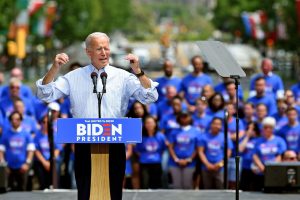
The Washington Beltway remains in a ‘tizzy’ over the direction of Biden foreign policy. Will Biden commit to the bipartisan ‘full-throated’ competition with China. Here, Ryan Hass of Brookings describes that continuing nervousness on the part of the foreign policy establishment over a possible Biden strategy :
There are a variety of causes for these concerns. Some security-focused experts worry that the Biden administration will prioritize cooperation with China on climate issues above other strategic concerns. Others fear that by signaling interest in cooperation, the United States will show lack of resolve for long-term great power competition with China. Proponents of viewing the U.S.-China relationship as an entrenched ideological struggle worry that cooperation could dilute the focus on what they describe as each side’s irreconcilable ambitions. Some have shared concerns that Beijing will withhold cooperation on climate issues unless it receives American concessions in other areas of the relationship, for example, on Hong Kong or Xinjiang. Others worry that the Chinese are wily negotiators who will hoodwink their earnest American counterparts if given the opportunity. Still others argue that engaging the Chinese as peers on climate issues provides undeserved validation of China on the world stage and legitimation of the Chinese Communist Party at home.
Besides Ryan Haas at Brookings, concern about Biden’s China policy has also been raised by his colleague, Thomas Wright. In TheAtlantic. Tom has suggested in a recent article that Biden’s choice of John Kerry as special presidential envoy on climate change may well create problems for the new Administration on the critical China file.
Competition with China will likely be the most difficult foreign-policy issue that President-elect Joe Biden will face. What he decides to lead with and the precise mix of areas in which he engages and confronts Beijing are critically important. This is why Biden’s choice of John Kerry as a special presidential envoy on climate change might create a problem for the incoming president on China policy.
In discussions with Biden colleagues, Wright comments that they expressed concern over Kerry diplomacy. Kerry’s single-minded focus on climate change could, according to these colleagues, bring climate policy progress but sacrifice other security-related US-China matters. As Tom described his conversations with these Biden folk:
A former Obama administration official told me, “China’s diplomacy is a constant search for leverage, and Kerry will deliver a load of it in a wheelbarrow right to their front door every day.
In the end, Hass rejects the view that climate policy with China will impair the Biden Administration’s competition with China. As Hass concludes:
The right question, therefore, is not whether to work with China on climate issues, but rather how best to explore policy coordination with China amidst a relationship that is defined by intensifying competition, and at a time when China is growing more repressive at home and aggressive abroad.
Hass concludes with a set of principles that should guide Biden foreign policy. Possibly the most relevant is the following principle:
The Biden administration’s efforts to build issues-based coalitions with allies and partners on China will be enhanced if Washington is transparent with them about its contacts with Beijing. Such efforts will be undermined if Washington is perceived as negotiating over its friends’ heads in its direct dealings with Beijing.
This principle underscores the need to treat its European, North American and Asian partners as peer actors and not junior allies. The four years of Trump destruction have left these earlier arrangements in the dust. Broad and shifting coalitions of consensus can move global governance issues forward – whether on climate, the pandemic or even on US-relations.
There is no doubt in my mind that the Biden people will be able to deal with the climate change issue and still compete with China. The real dilemma is how the West deals with China over human rights violations in Hong Kong, Xinjiang, etc. and how to successfully resolve the arbitrary and illegal arrests of foreign citizens by China.
Image Credit: Inquirer.com

